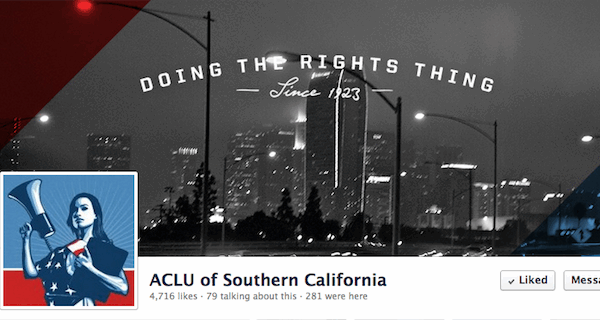Under the old guidelines, any kind of undercover work by LAPD intelligence officers was supervised by the Undercover Committee, a subcommittee of the civilian Police Commission. The Undercover Committee determines whether undercover investigations meet certain legal standards before they are opened.
But the new rules take online investigation using fake identities out from under the purview of that committee. Now the Committee’s approval will only be required if LAPD officers using a “fictitious online persona” engage in “ongoing interactive communications” with an “identified person or group.”
What exactly does that mean? It’s not clear. The term “ongoing interactive communications” isn’t defined anywhere in the new policy. It might mean that an undercover officer can “friend” you on Facebook and lurk in the background, watching what you and your friends post. It might also mean that undercover officers can “Like” pages belonging to groups like the Muslim Student Association and monitor the activity there. It could allow undercover officers to message you some number of times before it counts as “ongoing” communication — once? Five times? Ten? Twenty? The policy just isn’t clear.
Although it’s not clear what “ongoing interactive communication” is, we at least know what it
isn’t , sort of. At the September 28 Commission hearing, Deputy Chief Michael Downing clarified that approval for online investigative activity would not be required if the officers were simply looking at “open source” information, like articles on the Internet. Chief Downing also cited access to chat rooms as one form of online undercover activity that would
not require reasonable suspicion or supervisory approval.
But that’s precisely the kind of invasive and intrusive police activity that our society has consistently rejected. In 1975, the California Supreme Court heard
White v. Davis , a case in which a UCLA professor alleged that LAPD sent undercover officers into university classrooms to take notes on what professors and students were saying. The Court commented that the “presence of secret police” in certain spaces would result in comments being “recorded by police officers, filtered through the minds of the listening informers, often incorrectly misstated to their superiors and sometimes maliciously distended.” The Court decried the chilling effect of widespread police surveillance: “Only a brave soul would dare to express anything other than orthodoxy under such circumstances.”
The kind of police spying challenged in
White v. Davis is
exactly what the old rules were meant to prevent. In the early 1980s, a scandal broke when it was revealed that LAPD had a secret squad dedicated to snooping — the creepily named Public Disorder Intelligence Division, or PDID. PDID’s job was to spy on politicians, celebrities, and judges, and it compiled millions of pages of information about lawful activities in its intelligence files. The suit that the ACLU filed against theBoard of Police Commissioners resulted in a settlement that called for rules limiting LAPD’s ability to spy on law-abiding citizens — the same rules that the Police Commission is now eroding.
What’s the difference between sending secret police into classrooms and sending them into the online spaces and social networks where so much public debate now takes place? Not much. The threat to our freedom is just as great whether secret police infiltrate our lives on the Internet or otherwise. The new policies, however, treat the increasing use of these tools as an open invitation for more police surveillance of citizen activity, fundamentally changing the relationship between citizens and government.
Unless the Commissioners address these issues soon, be careful with your next Facebook status update. LAPD’s “fictitious online personas” might be reading, and they might get the wrong idea.

